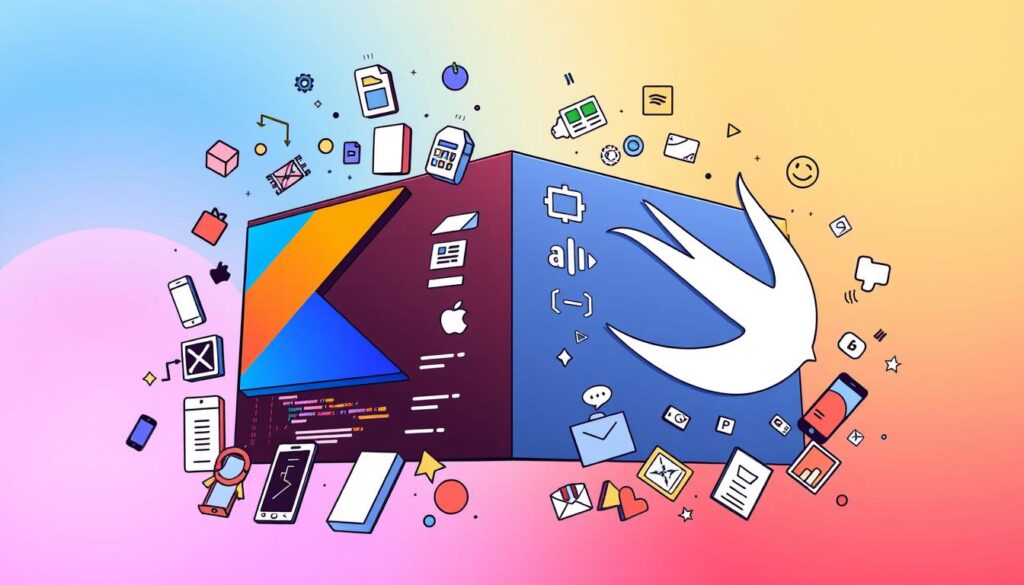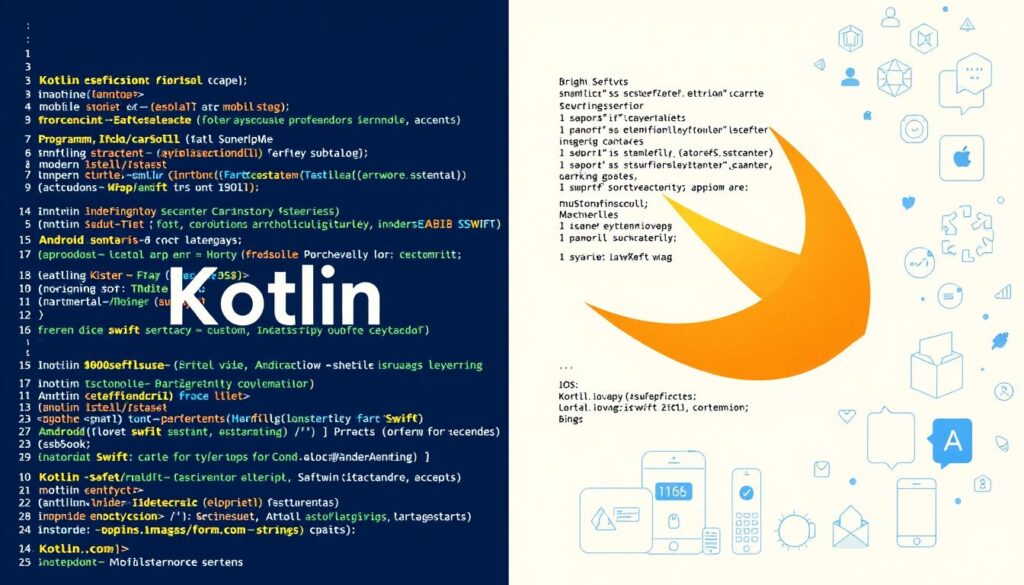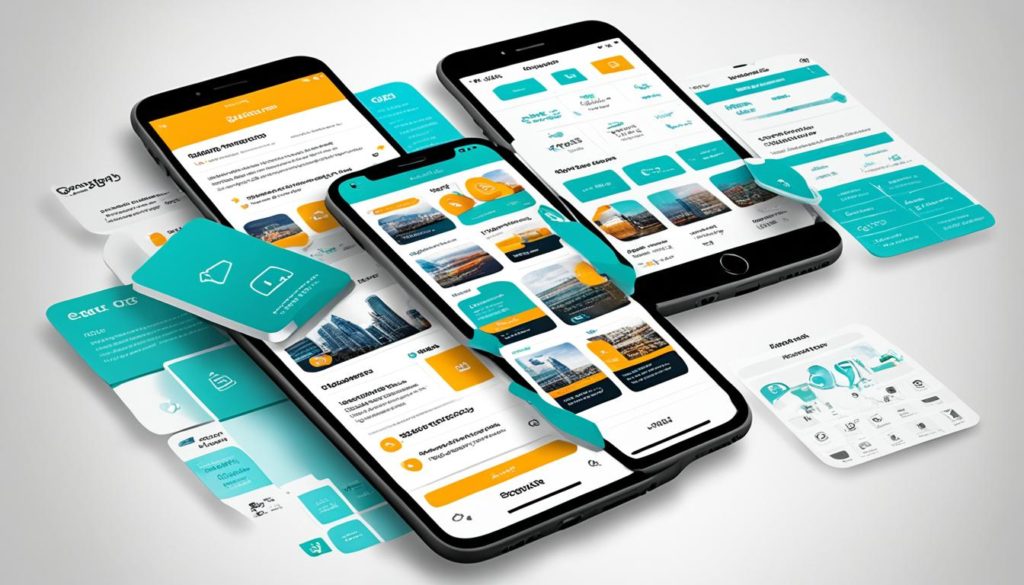
Did you know Swift is up to 2.6 times faster than Objective-C and 8.4 times faster than Python? This shows Swift’s strong performance in iOS app development. Kotlin, on the other hand, is Google’s top pick for Android apps. It works well with Java codebases, making it a great choice for developers.
Kotlin vs Swift? Choosing the right programming language is key for making mobile apps reliable and efficient. Kotlin and Swift are top picks for Android and iOS, respectively. Kotlin gets support from Google and JetBrains, while Swift is backed by Apple. This makes app development smoother for each platform.
Whether you’re new to mobile app development or have experience, knowing Kotlin and Swift’s strengths can help your project succeed. We’ll look into their history, performance, features, and community support. This will help you decide which language is best for your needs.
Key Takeaways
- Kotlin is recommended by Google for Android app development.
- Swift is designed by Apple for creating apps running specifically on iOS, macOS, watchOS, and tvOS.
- Kotlin enables developers to add new features to existing Java apps without starting from scratch.
- Swift streamlines the app-building process for Apple devices, making it faster and less error-prone.
- Kotlin provides performance on par with Java, particularly on the Android platform.
Understanding Kotlin and Swift
To choose between Kotlin and Swift for mobile apps, we need to know their history, ecosystems, and special features.
History and Development
Kotlin started in 2011 by JetBrains. It was made to fix Java’s problems. Google backed it in 2017, making it key for Android apps.
Swift came from Apple in 2014. It aimed to replace Objective-C with a modern, safe, and efficient language. Swift became open-source in December 2015, welcoming worldwide contributions.
Ecosystems and Compatibility
Kotlin and Swift have growing ecosystems. Kotlin works well with Java, making it easy to use in Java projects. It also stops null pointer exceptions, making code safer.
Swift is great for macOS, iOS, watchOS, and tvOS apps. It works well with Objective-C, helping with old code. Both languages have lots of resources, like docs and forums, for support.
Main Features and Unique Attributes
Kotlin has cool features like type inference and smart casts. It’s easy to learn for Java users. It also has built-in support for asynchronous programming.
Swift is known for type safety and optionals. It also has closures for functional programming. Its playgrounds help with quick coding and learning.
Swift’s ARC makes memory management easy, perfect for iOS apps. It also checks for errors at compile time, making code safer. Both languages support modern development well.
Performance Comparison Between Kotlin and Swift
| Performance Factor | Swift | Kotlin |
|---|---|---|
| Memory Management | Automatic Reference Counting (ARC) | Garbage Collection |
| Platform Optimization | Optimized for Apple Ecosystem | Optimized for Android Platform |
| Sorting Performance (Large Arrays) | Comparable when Compiled in Release | Superior Performance |
Both languages are great at keeping apps running smoothly and managing memory well. But, they do it best in different ways. Knowing how each language works is key for developers who want to make fast apps.
Kotlin vs Swift: Features and Syntax
Kotlin and Swift are designed to make coding easier. They have features that help developers work more efficiently. By looking at what each offers, we can pick the best tools for our projects.
Data Classes and Structs
Kotlin has data classes that make it easy to create classes for data. They come with important methods like equals() and toString() right out of the box. Swift, on the other hand, uses structs to group data and behaviors together. This helps keep data safe and consistent.
In Swift, you use “var” for variables and “let” for constants. Kotlin does the same with “var” and “val”.
| Swift | Kotlin | |
|---|---|---|
| Variable Declaration | var name: String |
var name: String |
| Constant Declaration | let name: String |
val name: String |
| Explicit Type Declaration | let explicitDouble: Double = 70 |
val explicitDouble: Double = 70.0 |
Extensions and Enums
Both Kotlin and Swift let you add new stuff to existing code without changing it. This makes code easier to manage and reuse. For example, Swift uses the extension keyword, and Kotlin does the same.
Swift’s enums help make code safer and clearer by grouping related values. Kotlin also has strong enum classes for handling related constants.
Each language has its own way of adding functions and properties to classes:
| Swift | Kotlin | |
|---|---|---|
| String Concatenation | let label = "The width is " + String(width) |
val label = "The width is " + width |
| String Interpolation | let fruitSummary = "I have \(apples + oranges) pieces of fruit." |
val fruitSummary = "I have ${apples + oranges} pieces of fruit." |
The world of programming is full of possibilities. By understanding Kotlin and Swift, we can make better choices for our projects.
Ease of Learning and Developer Availability
Kotlin and Swift are great for new developers in mobile app making. Kotlin, backed by Google since 2017, has a simple syntax that Java developers find easy. Swift, made by Apple, is also easy to learn and use for iOS apps.
Community and Ecosystem Support
Both Kotlin and Swift have strong communities. Kotlin’s community has grown a lot, thanks to Google’s support. Swift also has a big community, thanks to Apple.
New developers have many resources to help them learn. Both Kotlin and Swift have lots of tutorials and forums. This makes learning easier and helps developers solve problems.
| Aspect | Kotlin | Swift |
|---|---|---|
| Learning Curve | Gentle, especially for Java developers | Beginner-friendly, clean syntax |
| Community Growth | Rapidly expanding since 2017 | Strong and mature with continuous support |
| Developer Resources | Extensive documentation and tutorials | Comprehensive libraries and frameworks |
| Tutorials and Courses | Freely available and diverse | Plentiful, backed by Apple |
Learning Kotlin or Swift is easier with the help of their communities. Both languages offer great support and resources. This makes it easier for developers to learn and grow in their careers.
Choosing between Kotlin and Swift? Check out this comparison for more insights.
Conclusion
Choosing between Kotlin and Swift depends on your project’s needs and target platforms. Kotlin, introduced in 2017, is Google’s top choice for Android. It works well with Java, has great IDE support, and ensures null safety. This makes it a solid pick for Android apps.
Kotlin also has a big community and is widely used. This support helps developers work efficiently.
Swift, introduced in 2014, is perfect for iOS, macOS, watchOS, and tvOS. It’s known for being easy to read, fast, and great for quick prototyping. Swift is open-source and has a strong community backing it. Its safety features and dynamic libraries improve code reuse and performance.
Both Kotlin and Swift offer big advantages in terms of productivity and developer experience. Kotlin has features like type inference and concise syntax. Swift’s checks and readability make code better and easier to maintain.
In the end, picking Kotlin or Swift should fit your mobile app development plan. Whether you go for Kotlin’s Android Studio and Java compatibility or Swift’s Apple ecosystem performance, both languages lead to efficient app development.
FAQ
What are the main differences between Kotlin and Swift?
Kotlin is used for Android app development and works well with Java. Swift is for iOS and focuses on Apple device performance. Both make coding easier and more efficient.
Which language is easier to learn, Kotlin or Swift?
Kotlin is simpler for Java users. Swift is easy for beginners, thanks to its clear syntax and Xcode integration. Both have strong community support to help you learn.
How do Kotlin and Swift perform on their respective platforms?
Kotlin boosts Android app performance with the Java Virtual Machine. Swift optimizes for Apple devices with automatic memory management. Both handle complex tasks well.
What features make Kotlin and Swift stand out?
Kotlin has data classes for easy immutable data handling and Java integration. Swift uses structs and enums for clarity and safety. Both support extensions for adding new features.
How is the community and ecosystem support for Kotlin and Swift?
Both languages have active communities and rich ecosystems. You’ll find lots of documentation, forums, and commercial support. This makes it easier to use either Kotlin or Swift.
What factors should influence the choice between Kotlin and Swift for mobile app development?
The main factor is the platform you’re targeting. Kotlin is great for Android, while Swift is best for iOS. Consider your project needs, language skills, and platform-specific optimizations. Both languages are constantly improving.
Future App Studios is an award-winning software development & outsourcing company. Our team of experts is ready to craft the solution your company needs.










